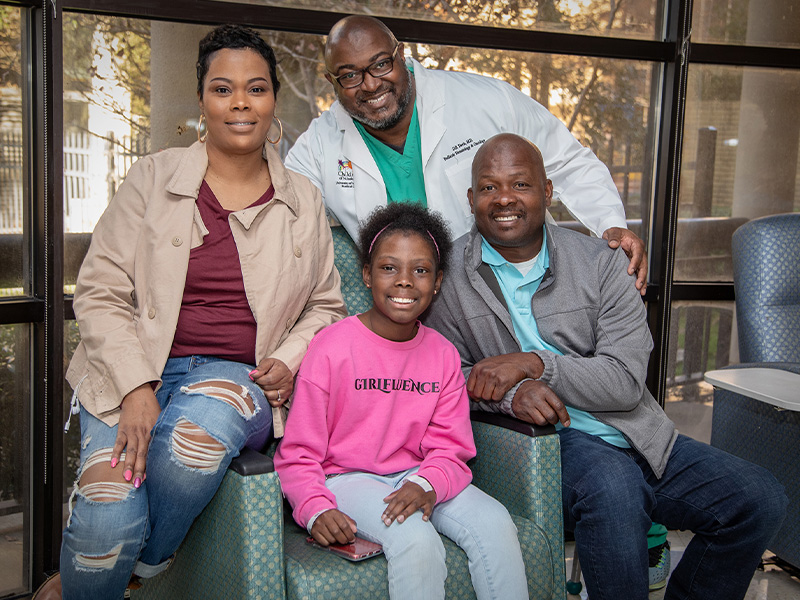
Our patients: State’s first pediatric haploidentical transplant patient sickle cell-free
Published on Monday, April 13, 2020
By: Annie Oeth, aoeth@umc.edu
What if a cure for your child’s life-threatening sickle cell disease depended on finding a match for a bone marrow transplant?
That was the situation Joneaset and Darold Mitchell of Flowood faced with daughter Kali, who became the first pediatric patient to receive a haploidentical bone marrow transplant in Mississippi. The transplant was performed by Children’s of Mississippi hematologist/oncologist Dr. Dereck Davis.
Kali, a straight-A student at Northwest Rankin Elementary, is now free from the sickle cell disease that once threatened her life.
A severe pain crisis sent Kali to the pediatric intensive care unit at the University of Mississippi Medical Center in 2016. There, she lived through pneumonia and other complications.
“Her doctors told us that, if she had another sickle cell pain crisis, it would be more severe and that she might not survive,” Joneaset said.
“They recommended that Kali get a bone marrow transplant.”
Sickle cell disease, an inherited condition in which there aren’t enough healthy red blood cells to carry adequate oxygen throughout the body, affects about 100,000 Americans and about one out of every 365 African-American babies.
The condition is named for sickle- or crescent-shaped red blood cells, which can get stuck in small blood vessels. This can slow or block blood flow and oxygen to parts of the body, causing pain and potential damage.
A bone marrow transplant offers the only potential cure for sickle cell anemia, but finding a donor who is an exact match can be difficult. In the past, when a fully matched donor could not be found, the bone marrow transplant was not possible. Now there is hope for these patients.
In haploidentical transplants, doctors use “half-matched” donors through a new drug protocol that allows the body to accept the matched donor cells and attack the cells that would keep the body from accepting the transplant.
“Nearly all patients who need a bone marrow transplant now have a potential donor,” Davis said. Joneaset was the closest match for Kali.
“I would do anything for her,” Joneaset said, “but donating bone marrow was not difficult. It required an overnight hospital stay, and it wasn’t very painful.”
Davis, a Shelby native and an alumnus of Tougaloo College, earned his M.D. at the University of South Alabama College of Medicine. He joined UMMC in July 2018 as an assistant professor of pediatrics after completing his pediatric residency and pediatric hematology-oncology fellowship here.
In 2017, Davis started a blood and marrow transplantation fellowship at Children’s Healthcare of Atlanta, a part of Emory University, which allowed him to bring pediatric haploidentical skills to UMMC. Children’s of Mississippi, the pediatric arm of the Medical Center, is the only place in the state children can receive those life-saving transplants.
“Kali was a good choice for a haploidentical bone marrow transplant because of previous compliance with medication, and she was in good health prior to the transplant,” Davis said. “Her transplant was completed over a year ago, and she is doing very well.”
Joneaset said her family hopes its experience will help others with sickle cell. “We’ve heard from other families and hope this treatment can help them, too,” she said.
Davis agreed.
“We are evaluating other children and educating families about all of the curative options for sickle cell disease,” he said. “Historically, only those with full-matched siblings were transplanted due to the significant risk associated with unmatched donor transplants.
“Haploidentical transplantation opens up a large pool of donors that previously we wouldn’t have had.”


